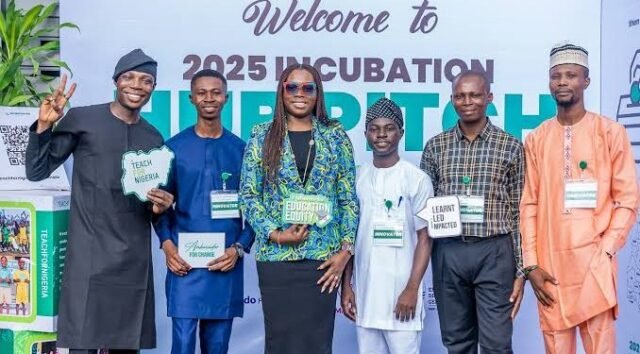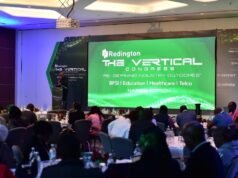In Lagos this week, the team at Teach For Nigeria (TFN) formally unveiled the outcomes of its 2025 Incubation Hub programme — showcasing a dozen trail-blazing alumni whose projects aim to tackle Nigeria’s deep-seated educational challenges. The air in the room was electric, filled with anticipation as industry leaders, funders and education advocates gathered to witness how young change-makers are pushing boundaries, leveraging technology, data and inclusive design to rewrite the future of learning in Nigeria.
Speaking at the opening of the event, TFN’s Chief Executive Officer, Molade Adeniyi, reminded attendees that the Hub is more than a contest — it is “a vehicle for systemic change”. She traced its evolution back to TFN’s commitment to empower alumni beyond their fellowship years, equipping them to grow their social innovations into sustainable enterprises. According to her, since its launch in 2020 the Hub has supported over 60 education-focused ventures, disbursed more than ₦10 million in seed funding, and reached upwards of 2,500 teachers and 15,000 children across Nigeria.
With these credentials in the background, the 2025 cohort was introduced — 12 initiatives across five strategic domains: EdTech & digital learning; gender equality and inclusive education; climate change & environment (in education contexts); teacher & school development; and data-driven education/policy. Over a period of three months, these early-stage entrepreneurs received enterprise development training, mentorship and strategic support to refine their ideas and build scalable, sustainable models.
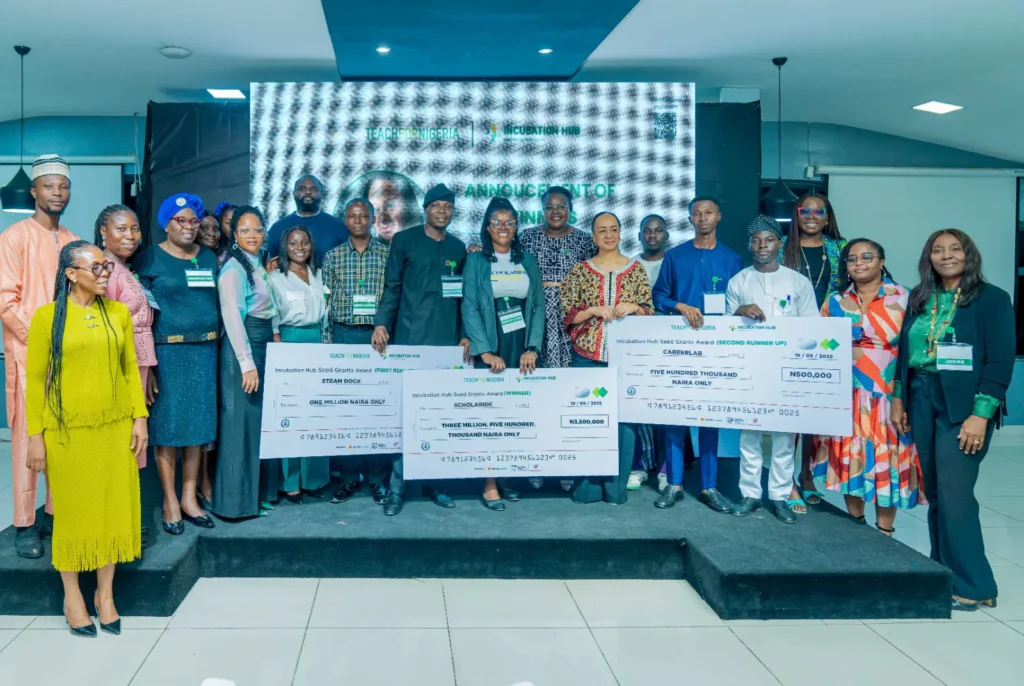
Table of Contents
What the Innovators at Teach for Nigeria Are Doing
At the heart of the competition were the pitches from the 12 selected innovators. A panel of judges — featuring senior executives from the Oando Foundation, British Council (Higher Education division), Wema Bank Technology Innovation unit and other stakeholders — provided feedback and ultimately selected the winners.
The top award went to Adetomiwa Awofeso, founder of the Scholaride Initiative. His project addresses literacy and numeracy gaps in Makoko by establishing community-based learning hubs and using the “Teaching at the Right Level” methodology to bridge foundational learning deficits in underserved waterways-side communities. First runner-up was Olayinka Adeosun of STEAM Dock, and the second runner-up was Emmanuel Epueme of CareerLab.
These solutions exemplify the diverse approaches emerging through the Hub: from mobile-first math tutoring platforms, inclusive design for girls in STEM, climate literacy modules for schools, to dashboards that enable school administrators to use real-time learning analytics to identify at-risk students. The common thread: leveraging innovation to root out the systemic barriers that have long held back Nigerian education.
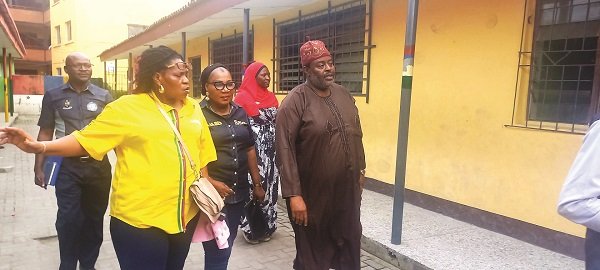
Why It Matters for Nigeria’s Education Landscape
The unveiling of these solutions is more than a showcase: it signals a shift in how we address education inequity in Nigeria. Too often, education interventions have been fragmented — pilot programmes that struggle to scale, or tech-fuelled solutions divorced from ground realities. TFN’s Incubation Hub offers a different model: one that begins with teachers and schools, focuses on enterprise viability, and builds towards scalability and sustainability.
In a country where learning outcomes remain troublingly low despite years of investment, interventions like these carry real potential. Take the literacy challenge: for many Nigerian children, especially those in under-resourced communities, foundational skills in reading and arithmetic are weak. A solution like Scholaride Initiative aims at catching and correcting those gaps early on, before they cascade into chronic school failure.
Likewise, the presence of gender-inclined, climate-aware and data-driven initiatives signals the breadth of the challenge and the maturity of the response. Nigerian classrooms are rarely designed with girls in STEM in mind; many schools lack environment-education integration, and few institutions leverage data to fine-tune teaching and learning. These are not marginal issues any more — they are central to re-imagining how schools function in the 21st century.
For policymakers and funders, the 2025 cohort provides a palette of scalable ideas ready to be amplified. For practitioners in Nigerian schools, it offers fresh collaboration possibilities. And for communities, it creates hope: hope that education can become both accessible and deeply effective, not just in theory but in practice.
Looking Ahead: Scale, Sustainability and Support
Understanding the magnitude of the challenge, TFN emphasised that the Incubation Hub will continue its annual cycle. The organisation sees the Bullish 2025 cohort not as an endpoint but as a milestone. With ongoing support, the aim is to help these early-stage ventures move into growth phases: more schools, more states, deeper impact.
Critical to that growth will be partnerships. TFN expressed gratitude to its supporters — namely Oando Foundation, Wema Bank, Enterprise Development Centre and other corporate and philanthropic sponsors — for their sponsorship and mentorship support. These partnerships help secure both funding and operational capacity, enabling startups to move from prototypes to fully-fledged solutions.
For the alumni entrepreneurs, the road ahead entails rigorous execution: field testing, monitoring & evaluation, refining business models, forging school system partnerships, and scaling responsibly. As one judge remarked during the event, “An idea without execution is just a promise.” The Hub is thus equipping innovators not just with ideas but with the tools to deliver measurable learning outcomes.
For the broader education ecosystem in Nigeria, there’s a lesson: impact lies at the intersection of innovation and system-readiness. The best solution will only succeed if it fits the context — the teacher’s reality, the school’s constraints, the learner’s world. By selecting alumni who have classroom exposure (through the TFN Fellowship), the Hub is reducing the innovation-gap between conception and real school practice.
Finally, there’s a question of sustainability: How will these ventures thrive beyond seed funding? How will they adapt to Nigeria’s fragmented school system, shifting policies, and infrastructure challenges? These questions were on the minds of several stakeholders in the room. But the tone was hopeful: we are no longer just launching ideas — we’re building platforms, partnerships and pathways for long-term change.
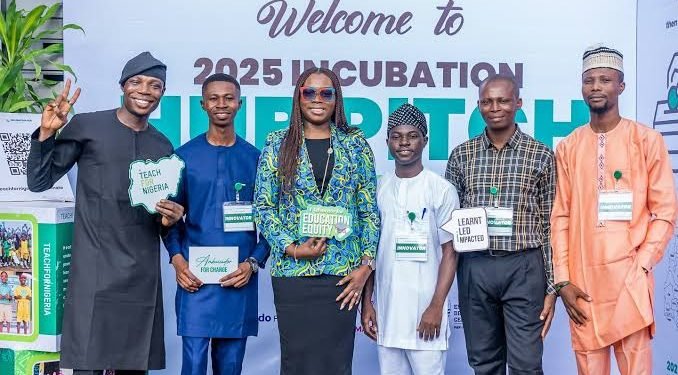
Conclusion
The 2025 Incubation Hub by Teach For Nigeria has once again proven that when education professionals, social entrepreneurs and strategic funders work together, we can move from rhetoric to results. The spotlight on these 12 ventures isn’t just about the winners; it’s about signalling that the future of Nigerian education lies in innovation grounded in context, ambition fuelled by execution and impact measured by lives changed.
As these initiatives move into their next phases, the real test begins: reaching the many, not just the few; sustaining momentum beyond competitions and pilot programmes; and ensuring that every Nigerian child — regardless of geography, gender or circumstance — can benefit from a quality education. The hub has done its part; now the ecosystem must rally behind it.
Join Our Social Media Channels:
WhatsApp: NaijaEyes
Facebook: NaijaEyes
Twitter: NaijaEyes
Instagram: NaijaEyes
TikTok: NaijaEyes
READ THE LATEST EDUCATION NEWS


